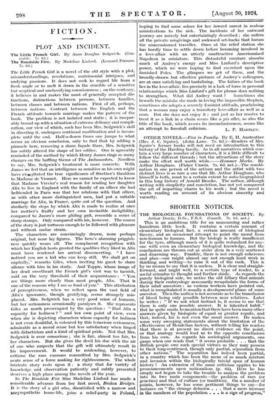FICTION.
PLOT AND INCIDENT.
The Little French Girl. By Anne Douglas Sedgwick. (Con- stable. 7s. 6(1.) The Link French Girl is a novel of the old style with a plot, misunderstandings, revelations, matrimonial intrigues, and undying passions. It does not seek to regard life from a fresh angle or to melt it down in the crucible of a sensitive but sceptical and unclassifying consciousness ; on the contrary, it believes in and makes the most of generally accepted dis- tinctions, distinctions between persons, between families, between classes and between nations. First of all, perhaps, between nations. Contrast between the English and the French attitude towards marriage makes the pattern of the book. The problem is not isolated and static ; it is insepar- ably bound up with a situation of extreme delicacy and compli- cation, our view of which, such has been Mrs. Sedgwick's skill in directing it, undergoes continual modification and is incom- plete until the end. Half-a-dozen times one jumps to what seems an obvious conclusion, only to find that by adding a pinnacle here, removing a sham facade there, Mrs. Sedgwick has subtly altered the shape of her edifice. One is agreeably reminded of the method by which Henry James rings so many changes on the baffling theme of The Ambassadors. Needless to say, Mrs. Sedgwick's treatment is more concrete. With James we feel that an intelligence as sensitive as his own might have ex*/ gitated the true significance of Strether's thraldom to Madame de Vionnet. Here we cannot be expected to know
• that Madame Vervier's real reason for sending her daughter Alix to live in England with the family of an officer she had - befriended in Paris was that her relations with that officer, as with other more distinguished men, had put a suitable marriage for Mix, in France, quite out of the question. And similarly the steps by which Alix is made to realize at once her mother's frailty and her own invincible ineligibility, compared to James's more gliding gait, resemble a series of sharp stamps. Only compared with his, however. The course of the story is just tortuous enough to be followed with pleasure and without undue strain.
The characters are convincingly drawn, none perhaps original, but none lay figures. The hero's alarming priggish- ness quickly wears off. The complacent recognition with which her English hosts greeted the qualities they liked in Alix must have rendered her arrival disconcerting. "I have noticed you are a kid who can keep still. We shall get on capitally," remarks Giles, when inviting his guest to share silence with him in his study. And Toppie, whose imAge of her dead sweetheart the French girl's visit was to tarnish, said on the very threshold of their acquaintance : "You see things more clearly than most people, Alix. That is one of the reasons why I am so fond of you." This attribution of perceptiveness, when we reflect upon the vast field of Alix's ignorance, though gratifying, seems strangely mis- placed. Mrs. Sedgwick has a very good sense of humour, • but her seriousness occasionally paralyses it. She represents Giles as much preoccupied by the question : "Had Alix a capacity for holiness ? " and hes own point of view, even when she is depicting characters whose capacity for holiness is not even doubtful, is coloured by this tenacious seriousness, • admirable as a moral sense but less satisfactory when tinged with didacticism and a kind of spiritual pride. Not that Mrs. Sedgwick is ever censorious ; she is fair, almost too fair, to her characters. But she gives the devil his due with the air of one who suspects that the gift will ultimately result in his improvement. It would be misleading, however, to criticise the rare excesses committed by Mrs. Sedgwick's acute sense of a force making for righteousness. The whole intricate story rests upon it ; a story that for variety of knowledge and observation patiently and subtly presented deserves a high place among the novels of the year.
In The Roadside Fire Miss Madeline Linford has made a considerable advance _from her first _novel, Broken Bridges. It is the story of a girl who, dissatisfied with a narrow and _unsympathetic home-life, joins a relief-party in Poland, hoping to find some solace for her inward unrest in zealous ministrations to the sick. The incidents of her outward journey are naively but entertainingly described ; she suffers all the private misgivings and awkward set-backs that harass the unaccustomed traveller. Once at the relief station she has hardly time to settle down before becoming -involved in a love-affair with an utterly unattractive Americanized Napoleon in miniature. This distasteful creature absorbs much of Audrey's energy and Miss Linford's descriptive power, which we were hoping to find exercised upon the famished Poles. The glimpses we get of them, and the broadly-drawn but effective pictures of Audrey's colleagues, are at once satisfying and tantalizing. The failure of the book lies in the love-affair, lies precisely in a lack of force in personal relationships which Miss -I inford's gift for phrase does nothing to strengthen. What did Audrey want ? Sometimes she bewails the mistake she made in loving the impossible Stephen, sometimes she adopts a severely feminist attitude, proclaiming that a woman may enjoy a transitory love-affair as well as a man. But she does not enjoy it ; and just as her resolve to treat it as a link in a chain seems like a pis alter, so also the title of the book, which avows its inconclusiveness, seems like an attempt to forestall criticism. L. P. HARTLEY.


































 Previous page
Previous page